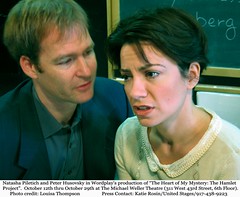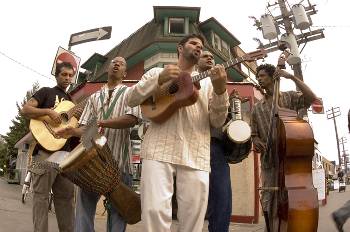Listen up, all you womenfolk! Do you want to understand what drives the human male? Do you wish to comprehend the vastness of his emptiness and grok his strange ways? Do you just maybe want to know what’s eating him? Then look no further than the works of The Man himself: Mr. John Hiatt, whose song lyrics explain it all.
Now, women, it’s nice when you love us, but after a certain point we become perplexed (and even begin to resent you) at your seeming failure to understand what a bastard we actually are. (Actually, what we don’t usually realize is that you knew it all along, but can’t act upon the knowledge because of some female-specific constitutional defect that remains a mystery to us.) Anyway, The Man explains it in “Angel Eyes”:
So tonight I’ll ask the stars above
How did I ever win your love?
What did I do, what did I say
To turn your angel eyes my way?
There’s no answer. Or if there is, the guy in the song sure doesn’t find it. He’s asking rhetorical-like questions, see. (Hiatt even has a song called “She Loves the Jerk.”)
The flip side of the “What the hell are you doing with me?” theme is “I swear I’ll always love you and be faithful, and by ‘swear’ I mean I’m gonna try.” Women and men are from the same planet, but words can mean different things to them. The Man sums it up in “Cross My Fingers”:
Baby when I put my mind to it
I slip into another gear
And I travel in another syncopation
When all I wanna be is here with you, and
I’ll be true to you – cross my fingers
I’ll be good to you – cross my fingers
See? He’s trying his best, which is all he can do.
Often it’s a futile effort, as in “Little Head”:
I’m loyal as a dog but I’m a hog for that sexual attraction
It starts up in my mind and makes a bee line below the belt
No consequences just satisfaction
Baby in my heart I’m faithful
This two headed monster is so distasteful
Forgive me when my instincts start stinkin’
I’m just so easily led when the little head does the thinkin’
Even you probably realize that when it gets right down to it, what makes you dig a guy isn’t his little head so much as his brain – expressed, usually, through his words. So who better than a master songwriter-dude to lay all this out so that even your confused female minds can understand it? In “Loving a Hurricane” The Man casts a cold clear eye on the process of courtship, and you’d do well to take note:
You [the man] answer questions like a natural disaster
Voices in the wind – you let ’em call her out
The whole foundation just went flying right past her
She puts her heart into it – and you just yank it out
You pulled her love out through the window pane
That’s what she gets for loving a hurricane
Let’s look closely at that. The song’s very first line establishes the importance of language in the process of love. “Answer[ing] questions like a natural disaster,” he’s using the power of his words to overwhelm her, to take away her sense of control over life – just as happens when nature rises up against us, except this is a form of surrender which she may like and encourage. The “voices in the wind” are the poetic tradition, which he draws upon to whip away her whole foundation, to “call her out” and “pull her love out.”
Traditions are everpresent in Hiatt’s lyrics. In “Your Dad Did,” Hiatt’s workingman hero, though no poet, also recognizes his debt to those who came before: “You’re a chip off the old block/Why does it come as such a shock/That every road up which you rock/Your dad already did?” Even this everyday married-with-children guy finds grace in what came before:
Well the day was long now, supper’s on
The thrill is gone
But something’s taking place
Yeah the food is cold and your wife feels old
But all hands fold
As the two-year-old says grace…
You love your wife and kids
Just like your dad did.
By contrast, a man not armed with at least the homiest wisdom of the ages is a lost soul, as in “Native Son”: “Running through the woods/And the burned out neighborhoods/Looking for someone/A member of your tribe/A place you can hide/’Til the war has begun.” Such a man’s loves can end only in something explosive (like a war) or in a quieter failure, as “Cry Love,” told from the woman’s point of view, shows:
The trust of a woman in his hand
But he was a little boy, not a man
You loved him stronger than he could feel
Yeah he was wrapped up in himself like an orange peel.
What looks to her like an stubbornly uncommunicative man is really a man paralyzed by his own thoughts, like the poor guy in “You Must Go”:
Love is in the air
You can smell it everywhere
It’s in your clothes, it’s in her hair
Ah, you better get out of there
It’s gonna take a midnight train
To straighten out your winding brain.
A lot of perfectly decent guys are caught up in this kind of situation and don’t know how to get out. Some are too smart for their own good, but for many it’s because they didn’t pay attention in school, don’t read books, and don’t know how to use their male brain as intended. The nerd gets the girl in the end, but not, as the Al Bundys of the world might think, because he’s rich; no, the nerd gets the girl because he does know how to use his male brain.
Sometimes the trapped man breaks out, as in “Feelin’ Again”:
I thought I had to curl up from my head down to my toes
But heaven knows that I was wrong, I’m feeling again
Holding my breath and holed up in this cheap motel, I feel like hell
I’m holding my own heart, I’m feeling again
Maybe he had to go through “alcohol fire,” like the guy in “Paper Thin,” but he escaped from inside himself. Still he feels “like hell,” because it’s overwhelming to be feeling so much: “When I get that feeling like a bass drum/Pounding til my head is numb/Electric onion peeling within…” He may have gotten the girl, but that awesome brain of his still can’t satisfy his craving for understanding. (Why did I get the girl?)
As you can see, Hiatt’s lyrics illustrate all the important iterations of the male condition:
1. I don’t know exactly who the hell I am, but I seem to be an asshole. Why do you love me?
2. I’m only my father’s son, so it ain’t my fault. Wait a minute, how did I get here? What is the meaning of – hey, you’re sexy!
“Only the Song Survives” distills this male confusion into a story in which a man dreams of a terrible car accident with a woman who may or may not be his wife. She explains:
Now don’t you remember they put a patch on your eye
Like Dread Pirate Roberts, you looked so unplanned
They cut off my wedding ring and you started to cry
A one-eyed Niagara Falls man
“But I never married,” objects the man. So is this injured woman with the wedding ring his wife? “Faces were changed… faces get strange,” goes the refrain – as they are wont to do in dreams. The dream-man looks “unplanned” because he is. What could be more unplanned, more emblematic of losing control, than a car accident?
But I woke up sweating to breakfast in bed
And there were my children, and there was my wife
Post-traumatic stress, or just a bump on the head?
Or maybe the ride of my life
It’s the ride of his life, all right, a ride of confusion, statelessness, and knocks on the head. Yet somehow his domestic life is still there for him. And he’ll never figure out why. Woman, to him, is magic, like the
woman sawed in half, her legs in Tijuana
She was a bodyless head and trapeze artist in a circus in Bombay
Now a woman’s gonna do exactly what a woman’s gonna
Yeah, some bad magicians wouldn’t have it any other way
She holds on to that trapeze by the skin of her teeth, or so they say
With images of a woman in two places at once and possessed of magical survival skills, Hiatt has now universalized his depiction of the split human condition. The passive (female) subject of the magic trick somehow finds her power and makes do even after she’s been cut in half. Meanwhile the “bad magician,” the songwriter, the caster of spells with words, feels his power, yet ultimately doesn’t understand it any better than the average joe of “Buffalo River Home” does:
I’ve been circling the wagons down at Times Square
Trying to fill up this hole in my soul but nothing fits there
Just when you think you can let it rip
You’re pounding the pavement in your daddy’s wingtips
As if you had some place better to go…
Although domesticated, and walking in his father’s footsteps, he’s still listening for that “Something Wild,” believing in the promise of “It’ll Come To You”:
Now you’re happily married with a wife and kids of your own
But sometimes in the closet at night you can hear them rattlin’ bones
Takin’ bets on your future and your current postal zone
It’s a spooky equation, but check out yourself, Jack, you’re the great unknown…
[but] in the middle of the night, with your covers pulled up tight
It’ll come to you
The understanding that will come to him, and the something wild that he both desires and fears, are two halves of the same nature. All of us have these dual natures. Now you know where to find out all you need to know about the particularly frustrating male version of this internal, eternal conflict: the lyrics of The Man himself, John Hiatt.

